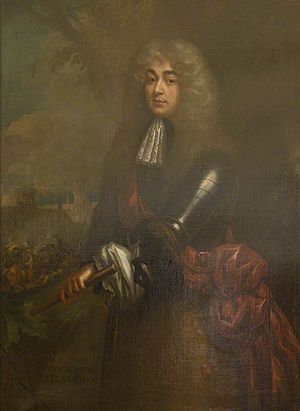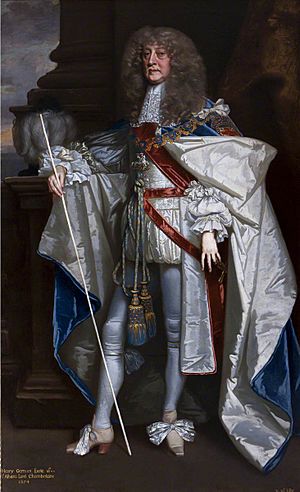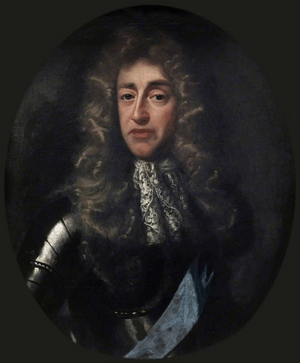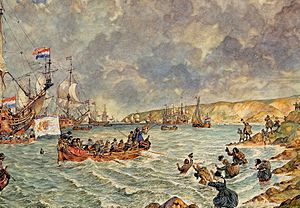Henry Jermyn, 1st Baron Dover facts for kids
Quick facts for kids
The Lord Dover
|
|
|---|---|

Henry Jermyn, 1st Baron Dover
|
|
| Born | c.1636 Rushbrooke Hall, Suffolk |
| Died | 6 April 1708 Cheveley, Cambridgeshire |
| Buried |
Bruges, Belgium
|
| Allegiance | |
| Commands held | Lieutenant-General of the Royal Guard |
| Battles/wars | Williamite War in Ireland |
| Spouse(s) | Judith Poley (m.1675) |
| Relations | Thomas Jermyn (father) Lord Jermyn (brother) Lord St Albans (uncle) |
Henry Jermyn, 1st Baron Dover (born around 1636, died 1708) was an important English nobleman and a close friend of King James II. He was also known as the 3rd Baron Jermyn.
Henry Jermyn came from a family that was very loyal to the King. After the King's family returned to power in 1660, Henry Jermyn joined the royal court of King Charles II of England. His powerful uncle, Lord St Albans, helped him get this position.
Jermyn became a Roman Catholic. He was a childhood friend of James, Duke of York, who later became King James II. When James became king in 1685, Henry Jermyn received many important titles and roles. He remained loyal to James even after the Glorious Revolution in 1688. During this time, he fought as a Jacobite in the Williamite War in Ireland. However, in 1690, he decided to support the new rulers, William and Mary.
Contents
Early Life and Family Background
Henry Jermyn was the second son of Thomas Jermyn, who lived in Rushbrooke, Suffolk. His mother was Rebecca Rodway. She later married Henry Brouncker.
During Henry's childhood, his family owned large estates in Suffolk. They were very loyal to the House of Stuart, the royal family of England. Henry's father was an equerry, a special assistant, to King Charles I. He supported the King during the English Civil War. Because of this, he spent some time living outside England.
Henry's grandfather, Thomas Jermyn, also served King Charles I. Henry's uncle, Lord St Albans, was a close helper of Henrietta Maria of France, the Queen. He was with her when she sought safety in France. Henry Jermyn was raised as a Protestant, following the Church of England.
Life at Court Under Charles II
After 1645, Henry Jermyn joined his father in exile from England. His uncle, Lord St Albans, helped Henry and his older brother, Thomas, get positions at the exiled royal court. Henry was given a job as a page, a young servant, in the household of James, Duke of York. This was even though King Charles II did not fully approve. Despite this, Prince James and Henry Jermyn became very good friends. Henry Jermyn was also known for his love of gambling.

When Charles II returned to the throne in 1660, Henry Jermyn was 24 years old. James appointed him as his master of horse, an important role in the royal household. Henry rode in the royal procession at Charles's coronation in 1661.
In August 1662, Jermyn was involved in a serious duel with Colonel Thomas Howard. Jermyn was badly injured and thought to be dead, but he recovered. However, his friend Giles Rawlings was killed in the duel. The reason for the fight was said to be a rivalry over a lady named Lady Shrewsbury.
In 1667, it was noted that King Charles was jealous of Jermyn. This was because Lady Castlemaine, one of Charles's mistresses, was said to be fond of Jermyn. She was also reportedly angry with Jermyn because he was planning to marry another lady.
Jermyn's uncle became Lord Chamberlain in 1672. This was a high position that seemed to secure Henry's place at court. However, in the early 1670s, Henry Jermyn converted to Roman Catholicism. Because of a law called the Test Act 1673, he was forced to leave his job in James's household. He was given a pension of £500 as a form of compensation.
In 1674, he bought a large estate called Cheveley near Newmarket. By 1681, Jermyn had rebuilt the house. He hired an artist named Jan Siberechts to decorate the inside. The main rooms of the house were filled with beautiful paintings, including one by Rubens. There were also portraits of members of the royal family. He also had a Catholic chapel built at the house.
On April 17, 1675, he married Judith Poley (1654–1726). She was the daughter of Sir Edmund Poley. Henry and Judith did not have any children.
Close Friend of King James II

When the Duke of York became King James II on February 6, 1685, Henry Jermyn remained one of his closest friends and advisors. Jermyn was the first of James's friends to be given a noble title. On May 13, 1685, he was made Baron Dover.
The new Lord Dover was able to return to court. There, he became an ally of other important figures like the Earl of Castlemaine and the Earl of Tyrconnell. This group encouraged James to remain true to his Catholic faith. This was happening even though Parliament was becoming more critical.
In May 1686, King James created a special troop in the Life Guards just for Catholics. He made Lord Dover its colonel. In the same year, James appointed him Lieutenant-General of the Royal Guard. However, Lord Dover sold some of the officer positions to French refugee gentlemen. He did this to help pay off his gambling debts.
On August 17, 1686, Dover was one of the first Catholics to be allowed into the Privy Council of England. This had not happened since the time of Queen Mary I. Soon after, he was given the important job of Lord Lieutenant of Cambridgeshire. He was the first Catholic to hold this position.
On January 4, 1687, Dover was appointed a Commissioner of the Treasury. He worked alongside other important officials. However, some people made fun of this appointment. They thought it was strange to give such a role to someone known for gambling. In 1688, he was made High Steward of Kingston upon Hull.
Even though he had a reputation for a wild private life, as a politician, he sometimes helped the King make more moderate decisions. He strongly advised James not to cancel the Act of Settlement 1662. His loyalty to James was never doubted at this point. He was also not afraid to speak his mind to the King, even in public.
Revolution and War in Ireland

During the Glorious Revolution in 1688, Lord Dover stayed loyal to King James. James appointed him Governor of Portsmouth in November 1688. Dover followed James when he went into exile in France. His house at Cheveley Park had been attacked by a Protestant crowd. He arrived in Calais on January 20, 1689, with Lady Dover and George Douglas.
Dover went with James when he landed in Ireland in March 1689. James hoped to win back his throne there. In July 1689, King James gave Dover new noble titles in the Jacobite Peerage. These included Baron Jermyn of Royston, Baron Ipswich, Viscount Cheveley, and Earl of Dover. The English government did not recognize these titles. However, Dover became generally known as the Earl of Dover.
During the conflict in Ireland, James sent Dover on missions to Dublin. On one occasion, he went to France to ask Louis XIV for more French help. Dover was a lieutenant-general in James's Jacobite army. He commanded the Gards du Corps. He told the Marquis de Louvois that the war in Ireland could be won with French support.
However, Dover soon became unpopular with both James's Irish and French supporters. He was appointed Intendant-General at Cork. There, he argued with his former friend, the Duke of Lauzun. King James blamed Dover for the poor welcome given to French soldiers who arrived in Ireland in March 1690. Lauzun made a formal complaint to James about Dover. Some French officials even thought Lord Dover should have been punished for his "inexcusable incompetence."
His friendship with James ended. Dover resigned in June 1690. He suggested that James should make peace with William III. He asked Tyrconnell for a passport to leave Ireland, but Tyrconnell refused. Dover went to Waterford and eventually found a way to leave Ireland. He fled to Bruges where he lived in poverty for a while.
In September 1691, he decided to return to England. He pledged his loyalty to William III. He was told he had nothing to fear. In November, the King granted him a pardon. However, in February 1692, the House of Commons of England voted against overturning the legal ruling that made Dover an outlaw.
Later Life and Legacy
Even though he was still legally an outlaw, the King gave him special permission to stay in England in 1698. Lord Dover spent the rest of his life living quietly. He stayed at his London house or at his country estate at Cheveley Park.
In 1703, he became the 3rd Baron Jermyn after his brother Thomas died. He was able to live off his inheritance. He died at Cheveley on April 6, 1708. According to his will, his body was moved to a Catholic convent in Bruges, Belgium. He was buried there in a special Catholic ceremony on May 24, 1708.
Since he had no children with his wife, Judith, his noble titles ended when he died. Cheveley was left to his wife for the rest of her life. His other property was inherited by the families of his nieces.
Dover Street in London's Mayfair area was named after Lord Dover. He was part of a group that developed the area in 1683.
Images for kids
 | Claudette Colvin |
 | Myrlie Evers-Williams |
 | Alberta Odell Jones |


